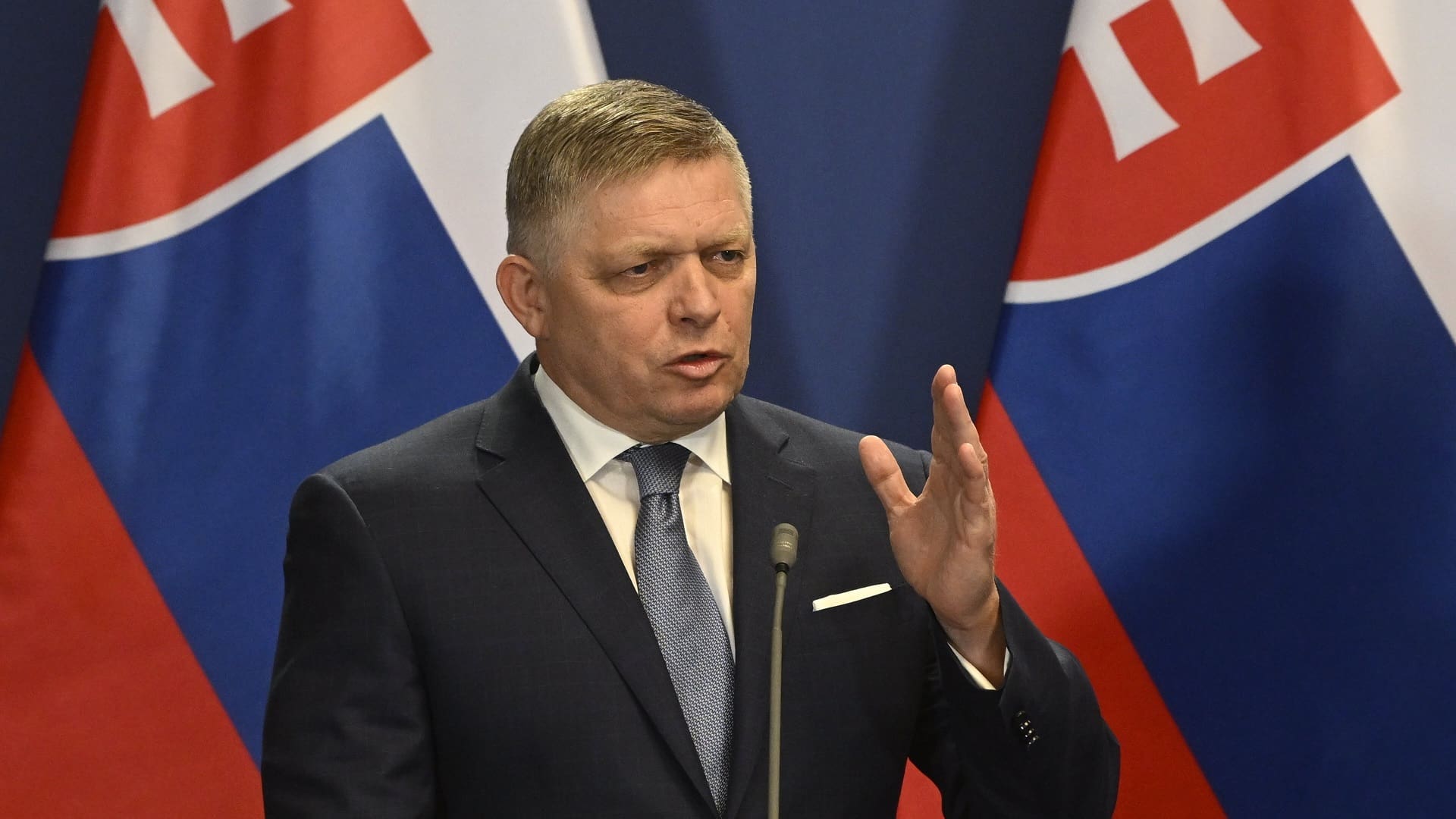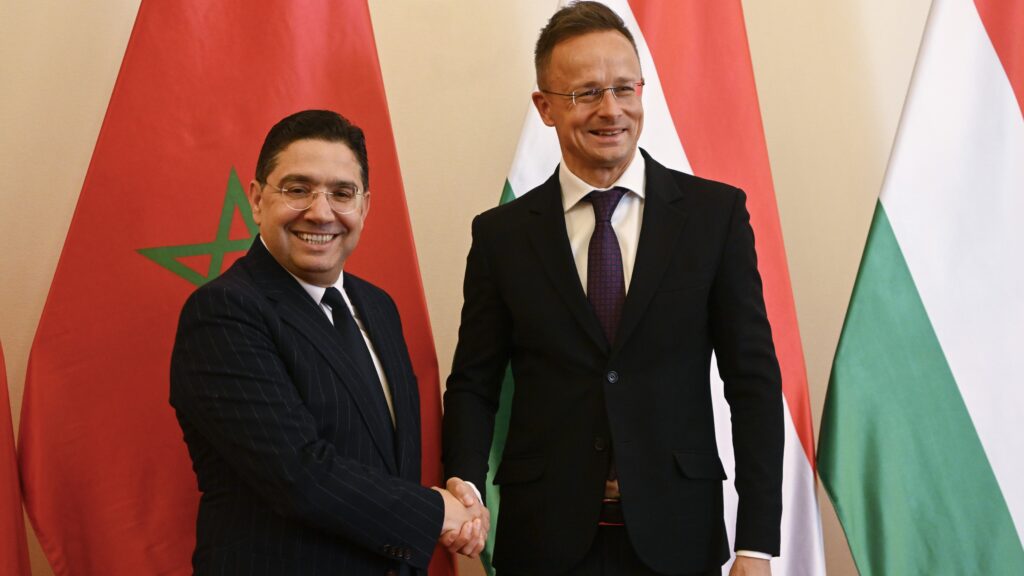Emerged from a near-fatal shooting, exasperated with liberal anti-democratic excesses, and emboldened by a new sheriff in Washington, Fico and allies have brought their battle against NGOs to parliament.
Slovakia has become a fascinating player in European geopolitics. In 2023, Robert Fico prevailed in parliamentary elections and began his fourth term as prime minister. Last year, in a precursor to events in the United States, Fico survived an assassination attempt—though his injuries were life-threatening. Responses from European leaders and institutions were lukewarm.
Other politicians might have resolved to keep a low profile in these circumstances, but Slovakia (population: 5.4 million) has continued to punch above its weight during this Fico government. Fico has joined Prime Minister Viktor Orbán in vocal criticism of the EU’s martial posturing in Ukraine, migrant-relocation machinations, and social activism. For Hungarians accustomed to clashing with the Slovakian government over historical and social issues, and aligning closely with the Polish government, the last year and a half has presented a remarkable departure from normal V4 relationship dynamics.
Observers in Brussels, Washington, and elsewhere have noticed this transformation as well. In 2024, after the discussion of the assassination attempt subsided, the EU threatened to withhold billions of euros from Bratislava due to ‘rule of law’ concerns, a tactic familiar to Hungarians and Poles. Western journalists have regularly branded Fico a far-right (or far-left) extremist, a Russian lackey, or an emboldened autocrat.
Late last year, a series of well-coordinated protests began to shake the Prime Minister’s narrow parliamentary majority. The events paralleled those of 2018, when Fico resigned from the prime-ministerial office amid civic protests and political unrest stemming from the mafia-linked murder of a journalist couple. The latest round of protests has continued into this year, though Fico has asserted: ‘We are too seasoned and experienced for some NGOs…to subvert our state.’
‘The new Trump administration has drawn widespread attention to the web of NGO activities, government funding, and ideological staffing realities’
At the heart of the protests is the organization Peace for Ukraine (Mier Ukrajine), which, despite its recent origins, has demonstrated impressive choreography, networking, and media reach. The group contends that the Fico government is reorienting the country away from Europe and toward Russia, an accusation to which Hungarians have become accustomed. It has orchestrated several rounds of demonstrations in Bratislava and other cities since late 2024.
These events are occurring at a fortuitous time, as the new Trump administration has drawn widespread attention to the web of NGO activities, government funding, and ideological staffing realities. Central Europe has been one region in the spotlight as Washington has targeted the USAID ideological patronage network, and Brussels has reportedly sought to fill the resulting financial gaps; likewise, when Vice President J.D. Vance chastised the European leadership class for its flagrant anti-democratic behavior at the Munich Security Conference. These phenomena—like Trump and Fico themselves—are not new in the European political landscape, but they are finally eliciting long-overdue societal dialogue.
For a small country, Slovakia has an extensive NGO ecosystem. Globsec is among Europe’s best-known international-relations organizations, and its annual Globsec Global Security Forum (which moved from Bratislava to Prague last year, following tension with the Fico government) regularly attracts luminaries of global governance. Globsec’s funding is opaque, its 2023 report (the most recent year available) notes: ‘Institutions (including governments) contributed 38 per cent of the total income’, while ‘Approximately 20 per cent of the total income came from foundations and NGOs’.
Other prominent liberal think tanks include the Bratislava Policy Institute and the Institute for Public Affairs. Via Iuris is a legal organization that states, ‘Our role is to defeat myths about NGOs…’ Then there is a plethora of civic activist groups like Peace for Ukraine. Early analysis of Biden-era USAID funding has revealed the following grants to activist groups in the country:
- Saplinq, o.z. – ‘to help promote and protect the human rights of LGBTQI+ people in Slovakia’;
- Iniciatíva Inakos – ‘to create a supportive environment for Slovakia’s LGBTQI+ minority’; and
- Dúha na východe, o.z. – ‘to support diversity, acceptance, and solidarity towards LGBTQ+ people and their families in eastern Slovakia’.
Among organizations headquartered abroad, the Center for European Policy Analysis (CEPA) and the German Marshall Fund (GMF) feature Slovak figures and aim to influence policy affecting Slovakia. Visegrád Insight, a media platform of the Polish Res Publica Foundation, presents its view of Slovakia to journalists, economists, and policy figures. The Soros Open Society Foundations network is active in the country. All of these organizations promote a liberal, transnational worldview and enjoy the backing of the Western political class.
‘Emerged from a near-fatal shooting…and emboldened by a new sheriff in Washington, Fico and allies have brought their battle against NGOs to parliament’
Emerged from a near-fatal shooting, exasperated with liberal anti-democratic excesses, and emboldened by a new sheriff in Washington, Fico and allies have brought their battle against NGOs to parliament. Last week, parliamentarians debated legislation necessitating financial transparency for NGOs. The current wording would require a transparency report—including sources of funding and membership data—for such institutions with annual income exceeding €35,000 and regulate how they engage in lobbying. Factions of the government coalition have quibbled over the wording of amendments, which has delayed key provisions.
Outside the halls of parliament, NGOs have reacted with predictable outrage. ‘Together, we are ready to use all transparent and democratic means to stop this law,’ vowed Peace for Ukraine. Via Iuris submitted a report claiming the law runs afoul of European law and the Slovak constitution. The Open Society Foundations unveiled in Bratislava the remnants of an ambulance reportedly destroyed by Russian drones in Ukraine—it is an allusion to the NGO ecosystem’s rallying cry that the new law is Russian-inspired.
The Slovakian law’s sponsors counter that it is closely based on a German law governing NGOs. In fact, the German law levies a €50,000 penalty for transparency non-compliance, far more severe than the Slovakian version. The German law also mandates a public registry of lobbying entities, as well as annual reports.
Slovak political scientist and former government minister Juraj Draxler believes NGOs’ ‘financial flows and personnel networks are relatively well known, even without the law.’ He also asserts that:
‘Everyone who needs to know, knows what [Transatlantic Fellow at the German Marshall Fund] Pavol Demeš is doing, where [Deputy Mayor of Bratislava and protest organizer] Lucia Štasselová came from, who [Senior Research Fellow at the German Council on Foreign Relations] Milan Nič is, what transnational networks formed around entities like the [British pro-market think tank] Legatum Institute are doing, what the various “security analysts” like [journalist] Victor Breiner and co. are capable—or, rather, incapable—of doing, who pays for Globsec, which “NGO” figures are friends with which journalists…etc., etc.’
Draxler also contends that government ministers know that, when they depart a public role, they are certain to find a landing place in the NGO ecosystem. Hungarians might note, for example, that former Prime Minister Gordon Bajnai sits on the board of directors of Globsec. Former President Zuzana Čaputová, counted among Anne Applebaum’s ‘harbingers of something else, something better, something that we can’t yet imagine’[i] in the 2020 book Twilight of Democracy, is currently a Visiting Fellow at Stanford University in California. It is no surprise, then, that this milieu is reacting with alarm to a threat to the status quo, one that ensures personal enrichment and political hegemony. Slovakia promises to remain interesting. Having become a hotbed of NGO activity, it is a fitting laboratory for uncovering the perverse network of NGO money and influence. Prime Minister Fico, like his counterpart in Washington, is on a mission during his second lease on life. Unravelling the scourge of NGOs would be arguably the crowning achievement of a long and volatile political career.
[i] Anne Applebaum, ‘The Unending of History’, Twilight of Democracy: The Seductive Lure of Authoritarianism, New York, Anchor Books, 2020, 181.
Related articles:








